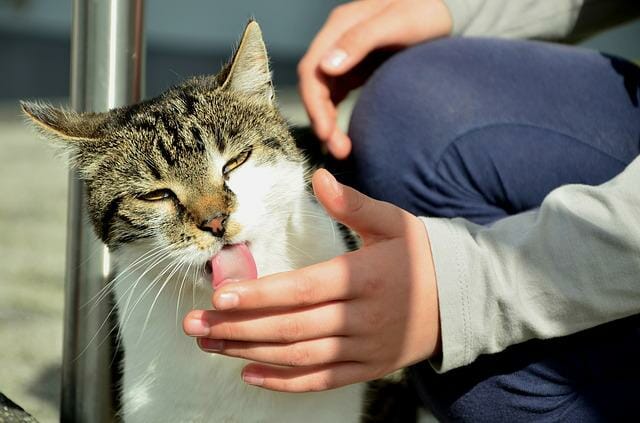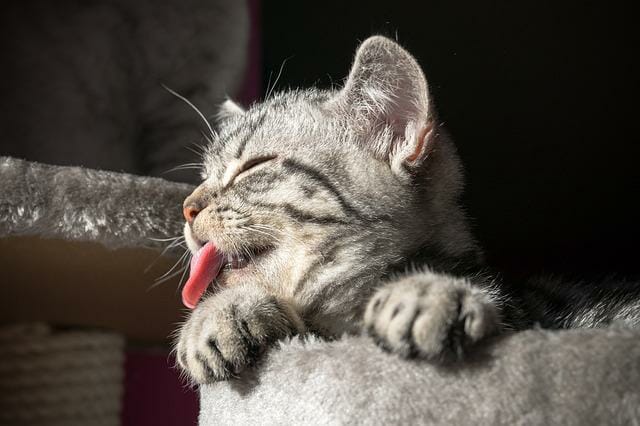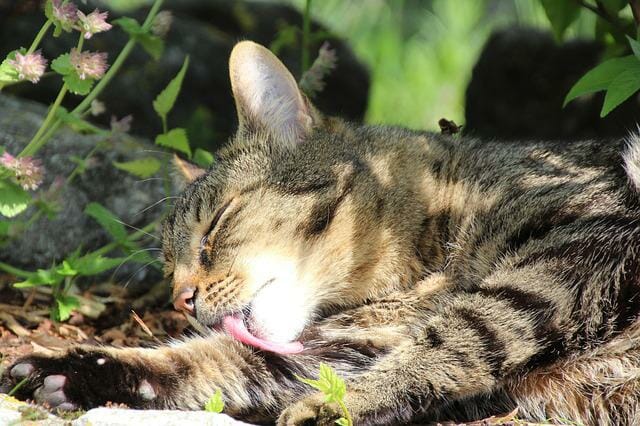Why Does My Cat Lick Me: Reasons Why Your Cat Lick You
Cats lick their owners for various reasons, including affection, grooming, and territory marking. Here are some possible explanations for why your cat may be licking you:
- Affection: Cats may lick their owners as a sign of affection. Licking is a way for cats to bond with their owners and show them they care.
- Grooming: Licking is also a natural grooming behavior for cats since birth, according to Hills Pet Nutrition. They may lick their owners to help clean their fur or to remove dirt or debris from their skin.
- Marking: Cats have scent glands in their mouths, so they may also lick their owners to mark their territory. Cats can claim their scent as their own by leaving their scent on their owners.
- Comfort-seeking: Some cats may lick their owners to seek comfort or attention. This behavior may be more common in cats that are anxious or stressed.


Table of Contents
Reasons Why Do Cats Lick You
Seeking Attention
Suppose your cat is licking you as a way of seeking attention. Positive reinforcement and attention are important when they display desirable behaviors, such as sitting calmly on your lap or playing with their toys. Here are some additional tips for addressing attention-seeking behavior in cats that may be helpful.
You may schedule specific times during the day to engage with your cat in playtime. This can give them the stimulation and attention they crave and may help reduce unwanted attention-seeking behaviors. Ensure your cat has access to plenty of toys and scratching posts to help keep them entertained and engaged.
If your cat engages in unwanted attention-seeking behaviors, such as meowing excessively or pawing at you, try ignoring them and only providing attention when they display desirable behaviors. For example, when your cat displays desirable behaviors, such as sitting calmly or playing with their toys, please give them plenty of positive reinforcement and rewards, such as treats or extra playtime.
Identifying You as Part of Their Group
Cats are social animals and may see their owners as part of their group or family. Licking allows cats to show affection and bond with their group members. Here are some additional tips for understanding and responding to your cat’s licking behavior:


- Don’t discourage the behavior: Licking is a natural behavior for cats and is often a sign of affection. While it may be unpleasant or uncomfortable for some people, it’s important to remember that your cat is simply showing you that they care.
- Provide alternative forms of affection: If you find your cat’s licking behavior too much, try providing alternative forms of affection, such as petting or cuddling. This can help redirect your cat’s attention and give them the affection they crave.
- Keep your skin clean: If your cat is licking you, it’s important to keep your skin clean to avoid any potential infections or irritations.
- Be mindful of overstimulation: Some cats may become overstimulated when engaging in affectionate behaviors like licking. Be mindful of your cat’s body language and signals, and give them space if they seem to be getting too excited or overstimulated.
Anxious
Cats may also engage in excessive licking as a sign of anxiety or stress. Try to determine what may be causing your cat’s anxiety. This could be due to changes in their environment, such as a move or the introduction of a new pet, or it could be related to health issues.
Ensure your cat has a calm and stable environment to reduce stress and anxiety. This may involve providing a quiet space for your cat to retreat to or changing their environment to make it more comfortable and safe. Provide your cat with plenty of toys and opportunities for play to help reduce anxiety and stress. This can include puzzle toys or interactive toys that encourage exercise and play.
If your cat’s anxious licking behavior persists or seems to be causing them distress, it may be a good idea to consult with a veterinarian or animal behaviorist. They can help identify any underlying health issues and advise addressing your cat’s anxiety.
Medical Issue
Excessive licking can indicate an injury or irritation on your cat’s skin, such as a wound or rash. Check your cat’s skin for any signs of injury or irritation and seek veterinary care. Cats can develop allergies to various things, including food, plants, and other environmental factors. If your cat is licking excessively, it may indicate an allergic reaction. Consult with your veterinarian to determine the underlying cause of the allergies and develop a treatment plan.


Some cats may develop digestive issues, such as acid reflux or gastrointestinal disorders, which can cause excessive licking. If you suspect your cat may have a digestive issue, consult your veterinarian for a diagnosis and treatment plan.
Some medical conditions, such as hyperthyroidism or anxiety disorders, can cause excessive licking in cats. For example, if your cat has an underlying medical condition, work with your veterinarian to develop a treatment plan to address the underlying issue.
Self-Soothing
Cats may also lick themselves excessively as a way to self-soothe. Some common stressors for cats include changes in their environment or routine, introducing new pets or people into the household, or loud noises such as thunderstorms or fireworks.
Excessive licking due to self-soothing can sometimes lead to hair loss and skin irritation, so addressing the underlying cause of your cat’s stress and providing appropriate stress-reducing measures is important. Some ways to help reduce cat stress include providing them a quiet and comfortable place to retreat, offering interactive toys and playtime, and using calming aids such as pheromone sprays or diffusers.
Establishing a consistent routine and avoiding sudden changes to your cat’s environment or schedule may also be helpful. For example, if your cat’s excessive licking behavior continues despite your efforts to reduce stress, it is best to consult a veterinarian for additional guidance.
